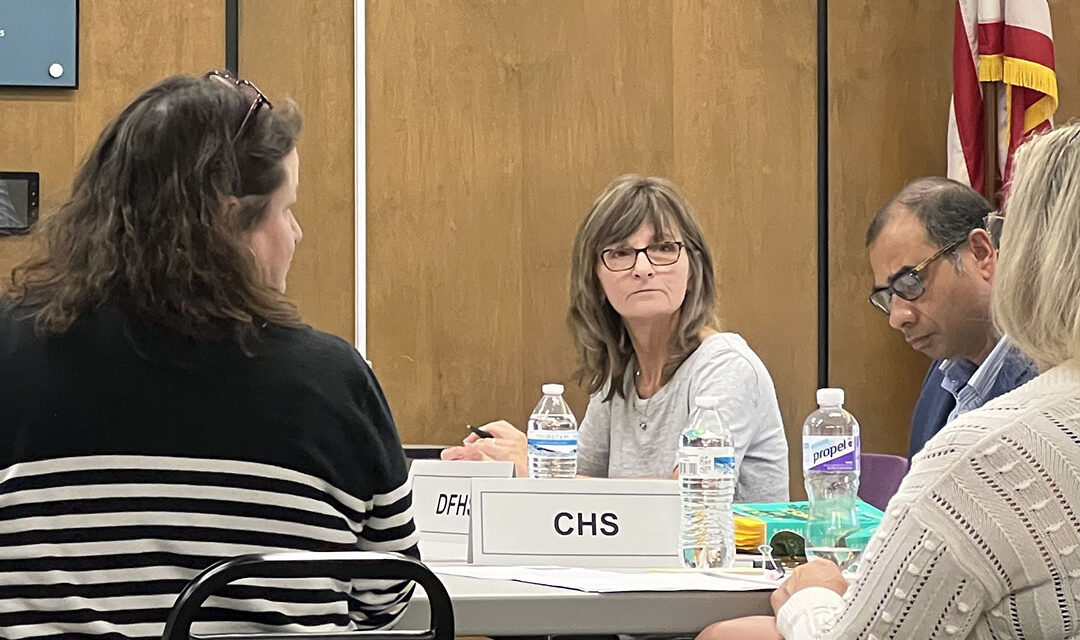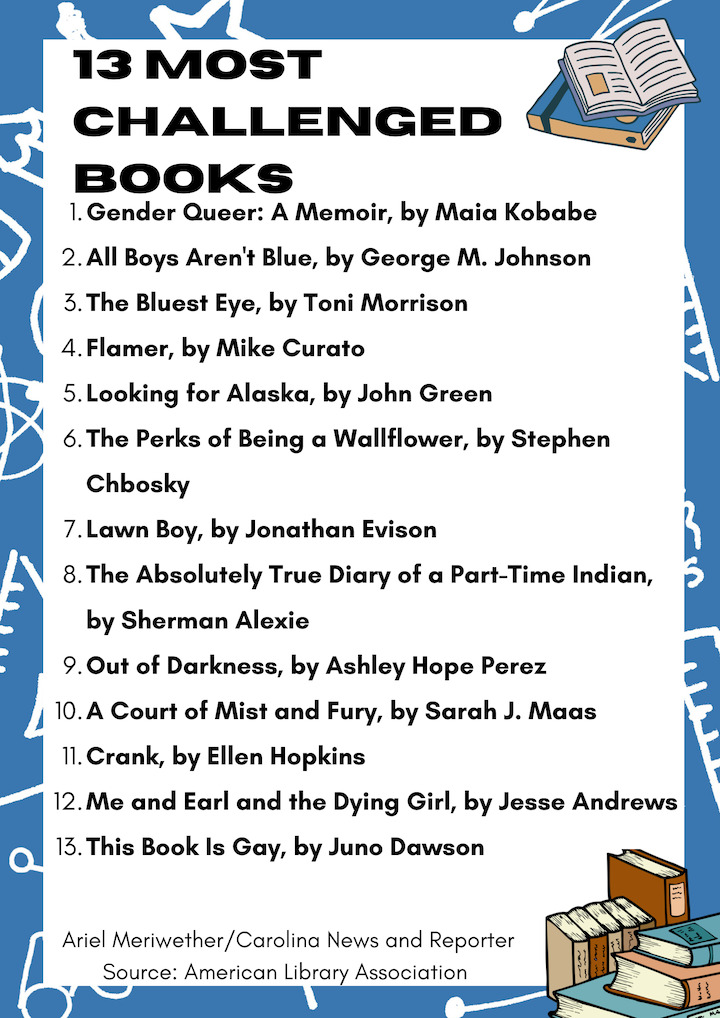Librarian Margaret Adams discusses Sarah J. Maas’ “A Court of Mist and Fury” during the Nov. 7 review committee meeting. (Photo by Ariel Meriwether/Carolina New and Reporter)
The 10th-most challenged book in the United States has returned to the high school libraries of School District Five of Lexington and Richland Counties.
The district temporality removed Sarah J. Maas’ novel “A Court of Mist and Fury” after county resident Karena Phelps challenged it for being sexually explicit. After a special committee voted 8-1 earlier this month, the book is back on shelves of the district’s four high schools.
Books and materials increasingly are being challenged at schools across the country, criticized as sexually explicit, using offensive language or unsuited to a particular age group. Each school district has a different procedure for considering those challenges. When a book is challenged in Lex-Rich Five, it is removed from shelves, read by the district committee, which then reports within 30 business days whether the materials are deemed inappropriate and should be removed from shelves.
If found “acceptable and appropriate,” the book is placed back in circulation.
The Nov. 7 committee meeting began with Carol Lungsford, the supervisor of Library Media Services, asking committee members to introduce themselves before they would speak. Several spoke, but only one gave their name.
Each member earlier had been given the submitted research material, a copy of the resident’s challenge and the district’s policy KEC Library/Media Center Materials Selection and Reconsideration process.
The review committee decided the novel was appropriate for recreational reading and was returned to shelves.
Phelps described the novel in the materials challenged form as being “pornographic material” and “sexually explicit.”
Phelps could not be reached for comment by the Carolina News and Reporter. She provided a phone number and an address identifying her as a resident of the district on the complaint form. But the district blacked out all personal information before sharing the form with the public. A district spokesperson, Laura McElveen, said the district could not make the information available.
The novel dives into the life of a faerie, a powerful and magical woman who abandons her unwanted marriage and starts the journey of finding her true love, in the meantime fighting an evil villain in their fantasy world.
After discovering her true love, or “mate,” the author describes the characters having an exchange of intense emotions through a physical relationship.
The story features four pages of consenting oral and penetrative sex between a man and woman who have accepted their “mating bond.”
Committee member and Media Specialist Margaret Adams said the sexual content was only a small part of the story. At the meeting, Adams pointed out a Cornell Law School definition that describes sexually explicit material as having “dominant” sexual themes.
“According to this definition … I don’t feel (it’s) dominant when you have a 624-page book,” Adams said. “A few pages, that would not be dominant.”
Many members of the review committee noted the complainant had not read the book. Lungsford confirmed that, in her complaint, Phelp wrote that she had not reviewed excerpts of the text and that she does “not read pornographic material.”
More questions were asked if the challenged novel is only in high school libraries and if it is assigned reading. It was confirmed the book is not required reading.
“We’re adults, and we know what things sometimes stretch our levels of comfort,” Adams said. “But as librarians, we are tasked with trying to bridge all of those things when we make selections” for school libraries.
Phelps wrote in her challenge that “the language in this book can’t be used verbally by students or worn on clothing but can be made available in the school?”
MONITORING CONTENT
The American Library Association monitors how often books are challenged in the United States and ranks the recently challenged novel at 10 as of 2022. It lists the book as being frequently challenged for being sexually explicit, with 48 challenges.
According to the district policy, materials can be challenged in the Lex-Rich Five district by an individual residing in the area of the school or a parent with a child in the district. It can also be a student who objects to the material.
Lungsford, the supervisor of library media services, explained during the first review meeting the novel would be read in full and would be reviewed based on “educational significance,” “appropriateness for students in each school” and “high artistic quality and/or literary style.”
The review committee is appointed by Superintendent Dr. Akil E. Ross and is made up of more non-district employees than those employed.
On Oct. 23, the review committee requested an extension for more time to review the book.
The district’s school board voted 4-2 with one abstention to deny the extension.
District Board of Trustees member Cathy Huddle voted against extending the review process.
The district’s review period already is twice as long as what the state Department of Education recommends, Huddle said.
Before the Nov. 7 vote, all committee members said they had read the book in its entirety.
“You have to have very good and fair rules in doing it. People have to be able to trust the process,” Huddle said. And, “you really need to read the whole thing because you can’t necessarily take something out of context.”
The policy allows the complainant to appeal the decision. Once the committee and board review the material, and any appeal, the book cannot be challenged for another five years from the original challenge date.
OTHER INSTANCES
The controversy surrounding this novel reached the state of Virginia in Aug. 2022. Two petitions brought by politicians said the book violates the state’s obscenity law and should not be sold.
A judge dismissed the petitions, saying the state’s law “was unconstitutional because it violates the First Amendment and due process,” according to a New York Times story.
In October 2022, a review committee in Lex-Rich Five reviewed “Black is a Rainbow Color” by Angela Joy.
This book, which was made available to elementary school children, was challenged by a resident for containing “Black Lives Matter imagery,” “divisive, political propaganda” and phrases that “may be confusing and harmful to certain students.”
The children’s book talks about things that are the color black, including items linked to African American heritage.
The committee voted the book acceptable.





